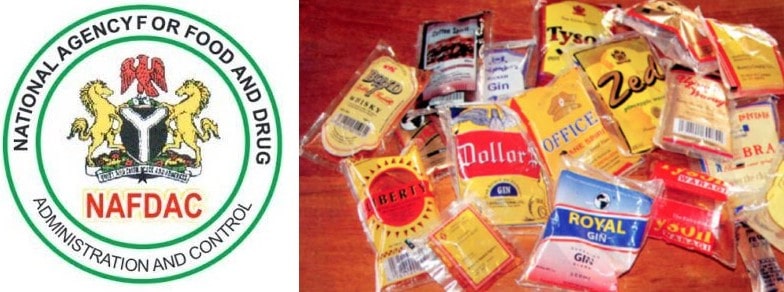In September 2018, the World Health Organization reported that the harmful use of alcohol kills over three million people worldwide each year, causes more than 5% of the global disease burden, including cancer and heart diseases.
In Nigeria, a high level of alcohol consumption has been blamed on easy access to alcoholic drinks mostly stored in sachets and small bottles, meaning there is little regulatory control. The implication is that cases of health complications linked to alcohol abuse are increasing.
But to contain the abuse of alcohol in Nigeria, the National Agency for Food and Drug Administration and Control or NAFDAC, yesterday announced a ban on the registration of alcohol in sachets, small volume glass above 30% ABV (alcohol by volume), and polyethene terephthalate (PET) bottles below 200 millilitres.
In a statement issued yesterday, the Director-General of the agency, Mojisola Adeyeye, stressed that the agency will ensure that the renewal of already registered alcoholic products in the affected category will not exceed the year 2024. She said the effort is expected to curb alcohol abuse across the country, especially among youths.
This development, however, was sequel to the recommendation of a high powered committee of the Federal Ministry of Health, NAFDAC, Federal Competition and Consumer Protection Commission (FCCPC) – represented by the Association of Food, Beverages and Tobacco Employers (AFBTE), and Distillers and Blenders Association of Nigeria (DIBAN) in December 2018.
According to the NAFDAC boss, DIBAN was also given “a matching order to embark on intensive nationwide sensitisation campaigns against underage consumption of alcohol by adolescents below the age of 18 years.”
She reiterated the commitment of the agency to implement regulatory measures that will safeguard the health of Nigerians.
“Even as we grapple with the containment of COVID-19 pandemic, NAFDAC is resolutely committed to the strict implementation of the regulations and regulatory measures towards safeguarding the health of Nigerians, particularly the vulnerable youths, against the dangers of reckless consumption of alcohol,” she said.





